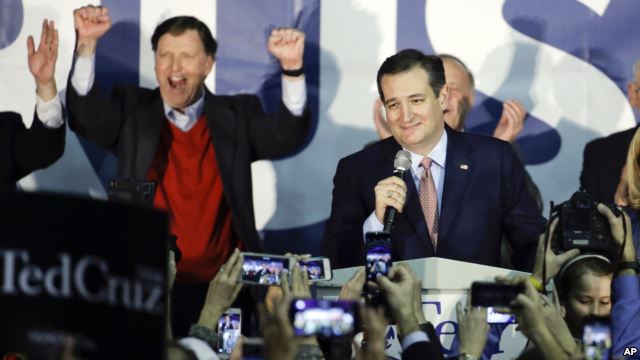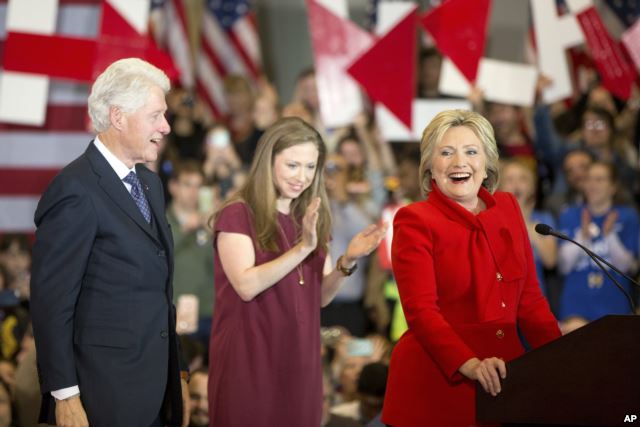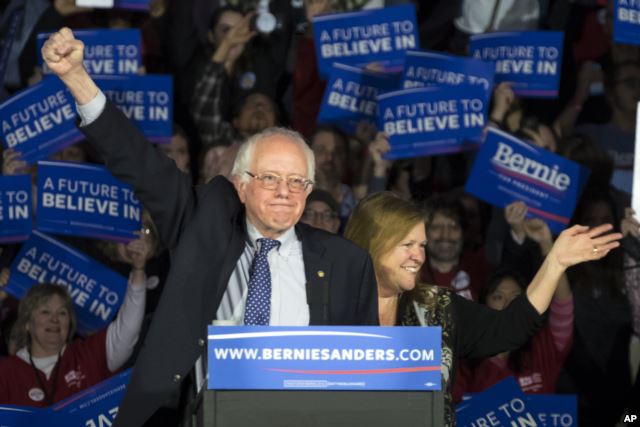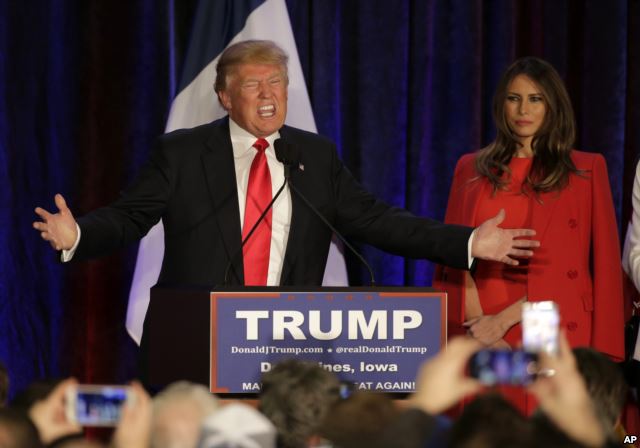 Republican presidential candidate Senator Ted Cruz of Texas beat Donald J. Trump in the Iowa caucuses on Monday, Feb. 1, 2016. (AP Photo)
Republican presidential candidate Senator Ted Cruz of Texas beat Donald J. Trump in the Iowa caucuses on Monday, Feb. 1, 2016. (AP Photo)
VOA News
By William Gallo
Updated on: February 02, 2016
DES MOINES, IOWA — Senator Ted Cruz defeated billionaire Donald Trump in Iowa’s Republican caucus Monday, while former Secretary of State Hillary Clinton barely edged Vermont Senator Bernie Sanders in the Democratic contest.
Cruz, a conservative lawmaker from Texas, finished with 28 percent of the vote. That is 3½ percentage points better than Trump, the national front-runner.
Florida Senator Marco Rubio finished with 23 percent, making him easily the leader among establishment Republican candidates.
On the Democratic side, Clinton and Sanders were in a virtual tie until the former Secretary of State was declared the winner Tuesday.
Voter sentiment
The results provided the first concrete look at voter sentiment, after a year of fierce campaigning and endless speculation.

Democratic presidential candidate Hillary Clinton, accompanied by former President Bill Clinton and their daughter, Chelsea Clinton, arrives at her caucus night rally at Drake University in Des Moines, Iowa, Feb. 1, 2016. (AP photo)

Democratic presidential candidate Senator Bernie Sanders of Vermont and his wife, Jane, acknowledge the crowd as he arrives for his caucus night rally in Des Moines, Iowa, Feb. 1, 2016. (AP photo)
After the results were announced, each candidate tried to spin the outcome in their favor.
Cruz, who came away as the night’s clear winner, sounded upbeat as he gave a victory speech in Des Moines.
“Let me first of all say, to God be the glory,” Cruz said to loud cheers. “Tonight, is a victory for the grassroots. Tonight is a victory for courageous conservatives across Iowa and all across this great nation.”
Subdued
Trump appeared more subdued, even while assuring his supporters he was “so happy with the way everything worked out.”

Republican presidential candidate, businessman Donald Trump speaks as his wife, Melania, watches at his caucus night rally in West Des Moines, Iowa, Feb. 1, 2016. (AP photo)
“We will go on to get the Republican nomination. And we will go on to easily beat Hillary or Bernie or whoever the hell they throw up there,” Trump said.
Rubio had his own reason to be optimistic after a better than expected third-place finish.
For months they told us we had no chance,” Rubio said. “But tonight here in Iowa, the people of this great state have sent a great message.”
Democrats
In her post-caucus speech, Clinton seemed to acknowledge there is a tough fight ahead with Sanders, the self-proclaimed democratic socialist who has outflanked her to the left on many issues.
“It is rare that we have the opportunity we do now to have a real contest of ideas,” she said. “I am excited about getting into a debate with Senator Sanders about the best way forward for America.”
For his part, Sanders sounded triumphant, as he pumped his fist in the air at a rally in the capital.
“Nine months ago, we came to this beautiful state, we had no political organization, we had no money, we had no name recognition,” he said.
“We were taking on the most powerful political organization in the United States of America. And tonight, while the results are still not known, it looks like we are in a virtual tie,” Sanders added.
Watch: Iowa Caucuses Set Stage for New Hampshire Primary
Iowa momentum
Iowa’s first-in-the-nation vote is seen as a crucial way for candidates to gain momentum in the U.S. primary election, which will continue to be held state-by-state until mid-June.
The goal is for candidates to win their party’s nomination by securing a majority of delegates, or party representatives, which are handed out based on the result of each state vote.
In Iowa, those delegates are rewarded proportionally rather than on a winner-takes-all basis.
And while Iowa rewards a relatively small number of delegates, the outcome is expected to create crucial narratives that will have a major impact on the race.
In Iowa, those delegates are rewarded proportionally rather than on a winner-takes-all basis.
That meant it was much less likely a clear winner would emerge from Iowa, said Arthur Sanders, a professor of politics at Drake University in Des Moines.
“When you have so many people running, for there to be a simple storyline is more complicated than it is when you only have three people running,” Sanders told VOA.
Next up: New Hampshire
The primary race now heads to New Hampshire, which will vote on February 9. That election will take place with a reduced field of presidential hopefuls.
As the Iowa results were released, GOP contender Mike Huckabee announced on Twitter he is suspending his campaign. Former Maryland Governor Martin O’Malley is also dropping his bid for the Democratic presidential nomination.
Kathryn Gypson and Kane Farabaugh contributed to this report.
—
Related:
Former NYC Mayor Bloomberg, Sensing an Opening, Revisits A Potential White House Run (NY Times)
Join the conversation on Twitter and Facebook.

























